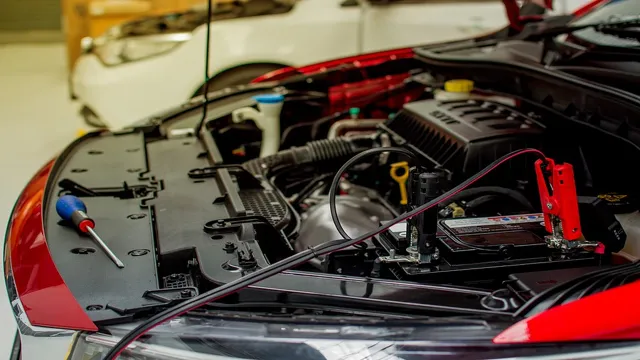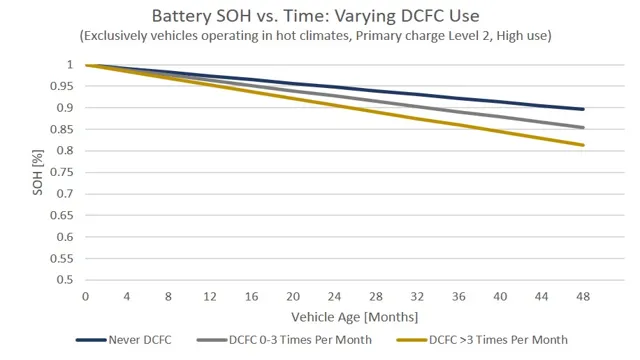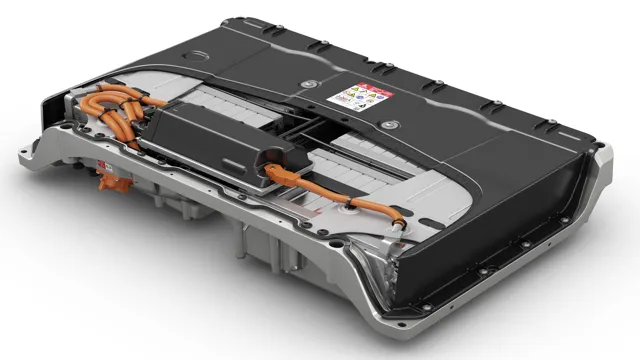How Long Do Electric Car Batteries Last? Discover The Truth!
Electric cars may seem like a futuristic concept, but they have become increasingly popular in recent years, thanks to their energy efficiency, eco-friendliness, and cost savings. However, one common concern among potential buyers is the battery life of electric cars. Many people wonder how long the batteries last and if they will need to be replaced often, which can significantly impact the total cost of ownership.
The battery life of an electric car can vary greatly depending on several factors, including the type of battery, the car manufacturer, how often the car is used, and the driving conditions. In general, most electric car batteries last between 8 to 10 years or around 100,000 to 150,000 miles, although some vehicles have been known to achieve even longer battery life. However, it’s worth noting that the battery performance tends to decline gradually over time, affecting its capacity to store and deliver power.
This decline is a natural part of the battery’s aging process and is influenced by the factors mentioned earlier. The good news is that electric car batteries have seen significant improvements in recent years. Newer models offer better energy density, faster charging times, and longer battery life than their predecessors.
Additionally, car manufacturers provide warranties for electric car batteries, which typically last around 8 years or 100,000 miles, whichever comes first. This warranty ensures that the battery can be replaced for free if it experiences significant degradation before the end of the coverage period. Overall, the battery life of an electric car is an essential factor to consider before making a purchase.
However, advances in technology and the warranty coverage provide peace of mind that the battery will last long enough to offer a significant return on investment, making electric cars a compelling option for eco-conscious drivers.
Introduction
Have you ever considered switching to an electric car, but wondered how long the batteries would last? It’s a common concern among potential buyers, but the answer is not straightforward. Several factors influence the lifespan of electric car batteries, including usage, weather conditions, and the quality of the battery itself. Generally, most manufacturers offer a warranty of 8-10 years or around 100,000 miles, whichever comes first.
However, with proper use, electric car batteries can last much longer than that. In fact, some drivers have reported using the same battery for more than a decade with no issues. Regular maintenance, including proper charging habits and routine checkups, can help prolong the life of your electric car battery and ultimately save you money in the long run.
So, if you’re considering making the switch to an electric car, don’t let battery lifespan scare you off. With the right care and attention, your electric car battery could last longer than you think!
Explaining Electric Car Batteries
Electric Car Batteries Electric car batteries are an essential component of electric vehicles. Unlike traditional cars that use gasoline or diesel, electric cars rely on batteries to power their engines. These batteries are complex, high-tech devices that use chemistry to store and release energy.
They are also different from household batteries, as they are much larger and more powerful. The batteries used in electric cars are made up of multiple cells, each containing an anode, a cathode, and an electrolyte solution. These components work together to create an electric charge, which is then used to power the car.
Understanding how these batteries work is critical to understanding how electric cars work. So, if you’re thinking about buying an electric car or just want to learn more about this technology, it’s a good idea to familiarize yourself with electric car batteries.

Why Electric Car Battery Life Matters
Electric car batteries are the heart of an electric vehicle, and its life plays a crucial role in the performance of the car. With its growing popularity, electric cars are seen as the future of transportation, and if we want to make the switch, we need to address the issues regarding battery life. As electric cars become more common, the demand for long-lasting batteries will increase.
People want to know if they can rely on the car’s battery to get them to their destination, how often they need to recharge, and how long the battery will last. Electric car manufacturers are well aware of this and have strived to provide better battery technology to meet these demands. In this blog post, we will explore the importance of electric car battery life and how it affects the electric vehicle industry.
Factors Affecting Electric Car Battery Life
Electric car battery life is affected by several factors that must be considered by car owners. The main factor is the battery chemistry used by the car’s manufacturer, which determines the battery’s lifespan. Lithium-ion batteries are commonly used in electric cars and have a lifespan of about 8-10 years.
Another factor affecting battery life is how often the car is charged and the charging speed. Rapid charging, for instance, can degrade the battery’s life faster than slow charging. Furthermore, environmental factors such as extreme temperatures can affect a battery’s lifespan.
High temperatures can accelerate the wear and tear of the battery, while low temperatures can decrease its capacity. The car’s driving style and the weight of the vehicle also affect the battery’s life. Heavy driving and frequent acceleration and braking put more strain on the battery, leading to a shorter lifespan.
It is important to consider all these factors when purchasing an electric car to ensure the best battery life and to properly maintain the battery throughout the car’s lifetime.
Driving Habits
Electric car battery life is affected by various factors such as driving habits. The way that you drive your electric car plays a significant role in maintaining your car’s battery life. If you drive aggressively or frequently speed up and slow down, you will consume more energy, which reduces your car’s battery life.
Another considerable factor is how you use the air conditioning system, headlights, and other electrical components in your electric car. When you use these features frequently, your car’s battery life will be affected negatively. An easy way to maintain your car’s battery life is to drive at a consistent speed and avoid rapidly accelerating or decelerating.
Additionally, you can reduce your car’s energy consumption by closing the windows and using the air conditioning only when necessary. Proper usage and maintenance of electric cars contribute to the longevity of electric car batteries, making them more sustainable and environmentally friendly.
Climate
Climate, Electric Car Battery Life The long-term performance of electric car batteries is crucial for their acceptance by the buyers. While numerous factors can influence a battery’s lifetime, climate appears to be one of the primary culprits that have an adverse effect on a battery’s lifespan. Electric car batteries suffer in extreme climates, such as high heat, which can reduce the battery life significantly.
Specifically, heat can cause a faster rate of battery degradation, leading to a shorter lifespan. On the other hand, electric vehicles can operate in colder temperatures, but the battery’s efficiency can weaken. In extremely cold weather, lithium-ion batteries become less effective in maintaining a charge for longer periods, making range anxiety a more significant issue.
Moreover, regenerative braking operational efficiency decreases in colder weather. Essentially, the battery takes longer to charge in cold conditions, reducing the available amount of power. In summary, an electric car battery’s lifespan can be impacted by the climate it operates in, with heat having more adverse effects than colder weather.
Therefore, it is essential to carefully consider the effects of a region’s climate before buying an electric vehicle and monitoring battery health regularly to ensure optimal performance.
Battery Type and Capacity
When it comes to electric cars, battery life is one of the most pressing concerns for drivers. There are several factors that can affect how long an electric car battery lasts, including the type and capacity of the battery itself. Lithium-ion batteries are currently the most commonly used type of battery in electric cars, primarily due to their high energy density and long cycle life.
Capacity is also an important consideration, as the more energy a battery can store, the longer it can power the car. However, higher-capacity batteries are often heavier and more expensive, making them less practical for some drivers. Other factors that can affect battery life include temperature, charging habits, and driving style.
By considering all of these factors, electric car owners can ensure that their batteries last as long as possible, providing reliable and efficient transportation for years to come.
Maintenance and Care
Electric car battery life depends on various factors, such as proper maintenance and care, temperature, driving habits, and charging practices. Neglecting routine battery maintenance can lead to significant battery degradation and shorten its life span. Thus, it is essential to keep the battery at optimal conditions, including monitoring the water levels, cleaning the terminals, and checking the cables’ tightness.
Further, extreme temperature fluctuations, either too hot or too cold, can affect the battery’s performance and longevity. Additionally, electric car drivers must adopt conducive driving habits, such as minimizing rapid acceleration, avoiding long periods of idling, and preventing overloading the battery capacity by reducing excess power consumption. Lastly, charging practices must be optimal, avoiding unnecessary charging with the proper charging level and avoiding charging the battery to its full capacity frequently.
A proper understanding of these factors and their effects on an electric car battery can help extend its useful life and maximize the driving experience.
Average Lifespan of Electric Car Batteries for Popular Models
Electric car batteries are one of the biggest concerns for people considering purchasing an electric car. The good news is that electric car batteries have come a long way in recent years. Most popular electric cars, such as the Nissan Leaf, Chevy Bolt, and Tesla Models, have batteries that can last up to 200,000 miles or more.
However, the lifespan of an electric car battery ultimately depends on many factors such as driving habits, weather conditions, and level of maintenance. For example, if you charge your battery frequently and let it run down to zero, your battery may wear out faster than if you charged it less frequently and kept it within a specific range. Additionally, extreme weather conditions, such as high temperatures, can shorten the lifespan of an electric car battery.
Overall, the average lifespan of an electric car battery for popular models is around 8 to 10 years, but with proper care, it can last even longer.
Tesla Model S
When it comes to electric cars, one of the biggest concerns for potential buyers is the lifespan of the battery. After all, replacing an electric car battery can be a costly endeavor. But the good news is that the average lifespan of batteries for popular electric car models like the Tesla Model S is actually quite impressive.
The Model S, for example, has a battery that is designed to last for up to 500,000 miles, which is longer than many gas-powered cars last before needing major repairs. Of course, there are factors that can affect the lifespan of an electric car battery, like driving habits, temperature, and maintenance. But as long as you take good care of your electric car and drive it responsibly, you can expect your battery to last for many years to come.
And when the time does come to replace your battery, you can rest easy knowing that newer batteries are becoming more affordable and more widely available every day. Ultimately, the lifespan of electric car batteries is improving all the time, and with the right care and attention, your electric car will continue to serve you well for years to come.
Nissan Leaf
The Nissan Leaf is a popular electric car, known for its impressive range and efficient battery performance. But just how long can you expect the battery in a Nissan Leaf to last? On average, the battery lifespan for the Nissan Leaf is around 8-10 years, or roughly 100,000 miles. However, it’s important to note that this can vary based on factors such as driving habits, climate, and maintenance practices.
Regularly charging the battery to full and avoiding extreme temperatures can help prolong its life. Additionally, newer models of the Nissan Leaf have improved battery technology, such as liquid-cooled systems, which may extend the battery lifespan even further. Overall, while the lifespan of electric car batteries can fluctuate, the Nissan Leaf is a reliable choice for those looking to make the switch to electric vehicles.
Chevrolet Bolt
When it comes to electric vehicles, the battery life is a major concern for many car buyers. The Chevrolet Bolt, for example, has an average lifespan of 10 years or 100,000 miles. This is thanks to the Bolt’s advanced battery technology and active thermal management system, which helps to protect the battery from extreme temperatures and improve its longevity.
Other popular electric car models, such as the Tesla Model S and Nissan Leaf, also have similar battery lifespans. However, it’s important to note that the lifespan of an electric car battery can vary depending on factors such as usage, charging habits, and climate. Proper maintenance and care, such as avoiding exposing the car to extreme temperatures and avoiding fully draining the battery, can help to extend the battery life.
Overall, electric car batteries have come a long way in terms of durability and lifespan, making them a more reliable and practical option for sustainable transportation.
Ways to Extend Electric Car Battery Life
Electric cars have become a popular mode of transportation in recent years due to their eco-friendly and cost-efficient benefits. However, one of the concerns frequently raised by potential buyers is the lifespan of electric car batteries. On average, electric car batteries can last up to 8-10 years, but if proper care is taken, they can last even longer.
One way to extend the battery life of an electric car is to not let it fully discharge before charging it again. Regularly charging the battery between 20-80% helps prevent strain on the battery. Another method is to avoid exposing the car to extreme temperatures, both hot and cold, as they can negatively impact the battery.
Lastly, it’s recommended to keep the electric car in use regularly, as prolonged periods of inactivity can cause the battery to degrade faster. By following these simple steps, electric car owners can significantly extend the lifespan of their batteries and enjoy a longer-lasting and more cost-effective vehicle.
Charging Practices
As electric cars become more popular, it’s important to understand the best charging practices to extend your electric car battery life. One of the most important things to keep in mind is to avoid fully charging your battery on a regular basis. Charging your battery to full capacity can cause stress on the cells and shorten the lifespan of your battery.
Instead, aim to keep your battery charged between 20% and 80%, which will help to reduce the risk of overcharging and over-discharging. Another way to extend your electric car battery life is to avoid fast charging whenever possible. While it may be convenient to use fast charging stations, they can put additional stress on the battery and reduce its overall lifespan.
Instead, regular charging at home or slow charging stations can help preserve your battery for the long term. With these simple charging practices, you can help to maximize the lifespan of your electric car battery and enjoy the benefits of eco-friendly driving for years to come.
Battery Management System
One of the key components of an electric car is its battery management system, which is responsible for monitoring and controlling the performance of the battery. To extend the life of an electric car battery, there are several ways to consider. One of the most crucial factors in preserving the battery life is to avoid discharging and charging the battery too frequently.
Car owners should aim to keep the battery level above 20% and avoid letting it drop to 0%. Additionally, it is essential to avoid exposing the battery to extreme temperatures that can affect its lifespan. Regenerative braking, an energy-saving technology that harnesses energy lost during braking and stores it in the battery, can also help to extend the battery life.
Furthermore, car owners can also consider using a battery conditioning system to optimize and extend the life of the battery. With proper care and attention to the battery management system, car owners can maximize the lifespan of an electric car battery and enjoy its benefits for longer.
Battery Replacement Options
As electric cars become more popular, there is a growing concern over the lifespan of their batteries. Fortunately, there are several ways to extend the life of your electric car’s battery. One option is to invest in a high-quality charger that will maintain the battery’s voltage and keep it from overcharging.
Another way is to avoid letting the battery drain completely by charging it regularly. Additionally, being mindful of your driving habits, such as avoiding rapid acceleration and braking, can also help prolong the battery’s lifespan. If the battery does begin to show signs of degradation, there are replacement options available, including having the battery rebuilt or investing in a new one.
It’s essential to consider the cost of replacement versus the value of the car before making a decision. By utilizing these tips, you can maximize the lifespan of your electric car’s battery and enjoy worry-free driving for years to come.
Conclusion
In conclusion, the lifespan of electric car batteries is a crucial factor for both car manufacturers and buyers. While battery longevity can vary depending on various factors such as climate, driving habits, and charging patterns, ensuring proper maintenance and care can significantly prolong their lifespan. Like any other piece of technology, electric car batteries will gradually degrade over time, but with advancements in battery technology, we can expect longer-lasting and more efficient batteries in the future.
So, while electric cars may not be a ‘forever’ investment just yet, they provide a sustainable and eco-friendly option for drivers looking to make a positive impact on the environment and reduce their carbon footprint.”
FAQs
What is the average lifespan of an electric car battery?
The average lifespan of an electric car battery is typically around 8-10 years, or about 100,000 miles driven.
Can the battery in an electric car be replaced?
Yes, the battery in an electric car can typically be replaced by a certified technician.
What factors can impact the lifespan of an electric car battery?
Factors that can impact the lifespan of an electric car battery include temperature extremes, frequent fast charging, and driving habits.
How long does it take to charge an electric car battery?
The time it takes to charge an electric car battery can vary depending on the type of charger being used, but typically ranges from 30 minutes to several hours for a full charge.
Can an electric car battery be charged using a regular household outlet?
Yes, many electric car batteries can be charged using a regular household outlet, though it may take longer to fully charge than with a dedicated charging station.





